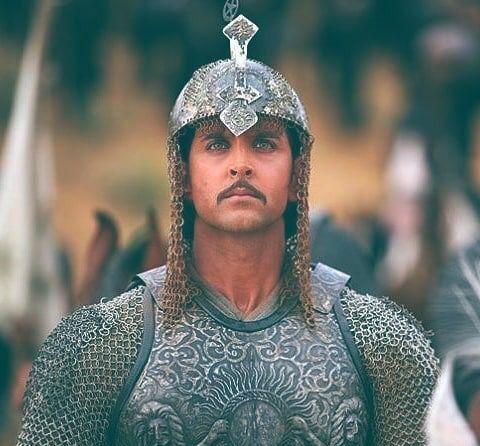The Mughal Empire was the last feudal dynasty in Indian history, founded by the nobleman Babur from Central Asia, whose patrilineal ancestors were Timur, the famous king of Central Asia, and the matriarchal line was from Genghis Khan. Obviously, for Indians, the Mughal Empire was a dynasty founded by foreign tribes, and many Mughal rulers were not liked by Hindus, but if the locals were asked on the streets of India which Mughal emperor they liked, most of the inhabitants would call out Akbar the Great's name.

Akbar the Great in film and television
Born in 1542 AD, Akbar was the third Emperor of the Mughal Empire, and during Akbar's reign, the Mughal Empire entered its heyday, Akbar expanded the territory of the Mughal Empire, and brought the economy and culture of the Empire into an unprecedented period of prosperity.
Compared with his grandfather Babur and his father Humayun, Akbar's education level is indeed much worse, and when Akbar was born, his father HumaYongzheng lived a bumpy and displaced life, so Akbar did not receive a good education in childhood. But this does not mean that Akbar will reject knowledge, he is a patron of knowledge and culture, he has built many libraries and schools, and he is often followed by many famous scholars.
Some historians have believed that Akbar the Great was the founder of the Mughal Empire, and the tolerant Akbar transformed the royal family of the Mughal Empire from a conqueror from Central Asia into the true master of India.
A building built in the Akbar era
Akbar's grandfathers Babur and Humayun did not have a strong sense of belonging to India, and although they established a powerful empire in India, they still considered themselves Central Asians, and they refused to integrate with the indigenous people of India.
Akbar, on the other hand, was tolerant of any ethnicity and faith, married a Hindu princess, and ordered the abolition of the poll tax on Hindus, which is why Akbar is still loved by Indians today.
In addition to reducing taxes for Hindus and reusing Hindu ministers, Akbar will also make Hindus accept him by changing some living habits, such as drinking the water of the Ganges every day, which is the "holy river" in the hearts of Indians.
Portrait of Akbar
In addition to this, Akbar was a vegetarian, eating very little meat products in his youth, and in his later years, his food was almost vegan. While Akbar's insistence on vegetarianism may not be entirely to curry favor with the Brahmin nobility who also did not eat meat, Akbar had his own views on vegetarianism.
It is not right to regard the human stomach as the grave of an animal.
The above sentence is Akbar's view of vegetarianism. Akbar's ability to stick to vegetarian food also shows his strong willpower, because in the Central Asian region of Humayun's grandfather Babur, it can be described as a "meat-eater's paradise", and the settled peoples and nomads of Central Asia are very fond of meat, while Hindus have always had a vegetarian tradition. After Babur conquered Central Asia, his followers also brought some of the Central Asian diets to India, and before Akbar the Great, the Mughal court maintained the central Asian diet.
Jahangir
Akbar's closeness to the Hindus also caused resentment among many ministers and members of the royal family, which eventually led to Akbar's bleak old age. Akbar lived a very long lifespan, although he only lived to the age of sixty-three, but it was already a high life expectancy among the Mughal royal family, and his grandfather Babur and Humayun did not live to be fifty years old.
After Akbar's eradication of the regent Byram Khan in 1560, Akbar ruled the Mughal Empire for more than forty years, and in his later years Akbar was still in good health, which led to his sons beginning to dislike and dislike their fathers, because they all wanted to inherit their father's throne early, and Akbar's high life made their wishes become far away.
In 1599, Akbar's eldest son, Jahangir, decided to rebel in order to inherit the throne as soon as possible, and After killing the empire's historian and his father's closest friend, Fazler, he led more than 30,000 soldiers to attack his father Akbar. After several unsuccessful attempts to persuade him to surrender, Akbar decided to give Jahangir a little color, and he led his army to defeat Jahangir's rebels, and after Jahangir's defeat, Akbar forgave his son tolerantly.
Mausoleum of Akbar the Great
After the rebellion, Akbar's life began to become very bleak, his sons quarreled every day over the throne, and his ministers began to "bet" on the princes, leaving Akbar with only a few of his closest friends.
At the time of Akbar's death, he was accompanied only by these few friends. As for the cause of Akbar's death, some believe that he suffered from malaria from excessive drinking of the Ganges, while others believe that Jahangir sent someone to poison Akbar. In short, on December 27, 1605, Akbar died, his funeral was very rudimentary, and his sons began to fight for the throne after only one day of mourning clothes.
After Akbar's death, Jahangir succeeded to his throne, and for a long time afterwards, the Mughal Empire seemed to be very prosperous, but Jahangir's brutality, Shah Jahan's profligacy, and Aurangzeb's conservative xenophobia laid the groundwork for the decline of the Mughal Empire.